Taeyoon Kwon
Designing Memory-Augmented AR Agents for Spatiotemporal Reasoning in Personalized Task Assistance
Aug 12, 2025Abstract:Augmented Reality (AR) systems are increasingly integrating foundation models, such as Multimodal Large Language Models (MLLMs), to provide more context-aware and adaptive user experiences. This integration has led to the development of AR agents to support intelligent, goal-directed interactions in real-world environments. While current AR agents effectively support immediate tasks, they struggle with complex multi-step scenarios that require understanding and leveraging user's long-term experiences and preferences. This limitation stems from their inability to capture, retain, and reason over historical user interactions in spatiotemporal contexts. To address these challenges, we propose a conceptual framework for memory-augmented AR agents that can provide personalized task assistance by learning from and adapting to user-specific experiences over time. Our framework consists of four interconnected modules: (1) Perception Module for multimodal sensor processing, (2) Memory Module for persistent spatiotemporal experience storage, (3) Spatiotemporal Reasoning Module for synthesizing past and present contexts, and (4) Actuator Module for effective AR communication. We further present an implementation roadmap, a future evaluation strategy, a potential target application and use cases to demonstrate the practical applicability of our framework across diverse domains. We aim for this work to motivate future research toward developing more intelligent AR systems that can effectively bridge user's interaction history with adaptive, context-aware task assistance.
Embodied Agents Meet Personalization: Exploring Memory Utilization for Personalized Assistance
May 22, 2025Abstract:Embodied agents empowered by large language models (LLMs) have shown strong performance in household object rearrangement tasks. However, these tasks primarily focus on single-turn interactions with simplified instructions, which do not truly reflect the challenges of providing meaningful assistance to users. To provide personalized assistance, embodied agents must understand the unique semantics that users assign to the physical world (e.g., favorite cup, breakfast routine) by leveraging prior interaction history to interpret dynamic, real-world instructions. Yet, the effectiveness of embodied agents in utilizing memory for personalized assistance remains largely underexplored. To address this gap, we present MEMENTO, a personalized embodied agent evaluation framework designed to comprehensively assess memory utilization capabilities to provide personalized assistance. Our framework consists of a two-stage memory evaluation process design that enables quantifying the impact of memory utilization on task performance. This process enables the evaluation of agents' understanding of personalized knowledge in object rearrangement tasks by focusing on its role in goal interpretation: (1) the ability to identify target objects based on personal meaning (object semantics), and (2) the ability to infer object-location configurations from consistent user patterns, such as routines (user patterns). Our experiments across various LLMs reveal significant limitations in memory utilization, with even frontier models like GPT-4o experiencing a 30.5% performance drop when required to reference multiple memories, particularly in tasks involving user patterns. These findings, along with our detailed analyses and case studies, provide valuable insights for future research in developing more effective personalized embodied agents. Project website: https://connoriginal.github.io/MEMENTO
Web-Shepherd: Advancing PRMs for Reinforcing Web Agents
May 21, 2025
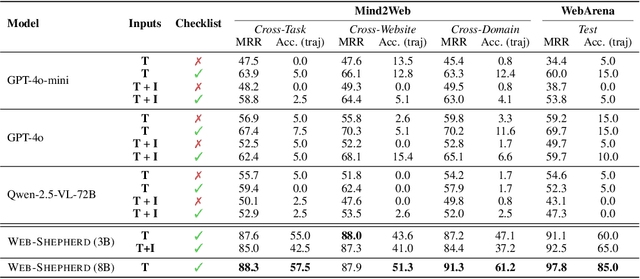
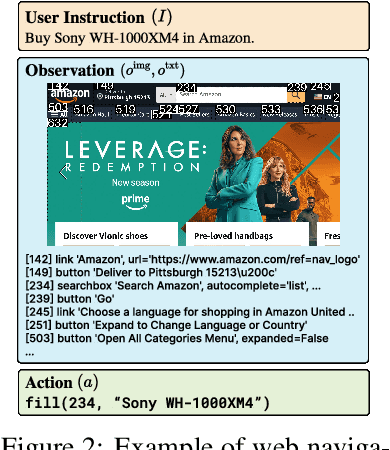

Abstract:Web navigation is a unique domain that can automate many repetitive real-life tasks and is challenging as it requires long-horizon sequential decision making beyond typical multimodal large language model (MLLM) tasks. Yet, specialized reward models for web navigation that can be utilized during both training and test-time have been absent until now. Despite the importance of speed and cost-effectiveness, prior works have utilized MLLMs as reward models, which poses significant constraints for real-world deployment. To address this, in this work, we propose the first process reward model (PRM) called Web-Shepherd which could assess web navigation trajectories in a step-level. To achieve this, we first construct the WebPRM Collection, a large-scale dataset with 40K step-level preference pairs and annotated checklists spanning diverse domains and difficulty levels. Next, we also introduce the WebRewardBench, the first meta-evaluation benchmark for evaluating PRMs. In our experiments, we observe that our Web-Shepherd achieves about 30 points better accuracy compared to using GPT-4o on WebRewardBench. Furthermore, when testing on WebArena-lite by using GPT-4o-mini as the policy and Web-Shepherd as the verifier, we achieve 10.9 points better performance, in 10 less cost compared to using GPT-4o-mini as the verifier. Our model, dataset, and code are publicly available at LINK.
Rethinking Reward Model Evaluation Through the Lens of Reward Overoptimization
May 19, 2025Abstract:Reward models (RMs) play a crucial role in reinforcement learning from human feedback (RLHF), aligning model behavior with human preferences. However, existing benchmarks for reward models show a weak correlation with the performance of optimized policies, suggesting that they fail to accurately assess the true capabilities of RMs. To bridge this gap, we explore several evaluation designs through the lens of reward overoptimization\textemdash a phenomenon that captures both how well the reward model aligns with human preferences and the dynamics of the learning signal it provides to the policy. The results highlight three key findings on how to construct a reliable benchmark: (i) it is important to minimize differences between chosen and rejected responses beyond correctness, (ii) evaluating reward models requires multiple comparisons across a wide range of chosen and rejected responses, and (iii) given that reward models encounter responses with diverse representations, responses should be sourced from a variety of models. However, we also observe that a extremely high correlation with degree of overoptimization leads to comparatively lower correlation with certain downstream performance. Thus, when designing a benchmark, it is desirable to use the degree of overoptimization as a useful tool, rather than the end goal.
Evaluating Robustness of Reward Models for Mathematical Reasoning
Oct 02, 2024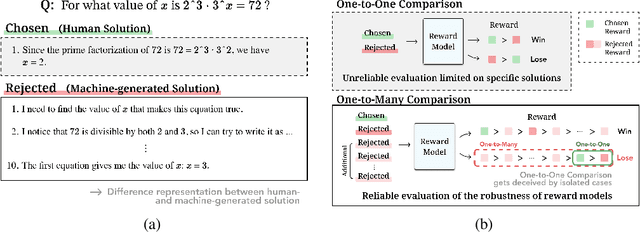
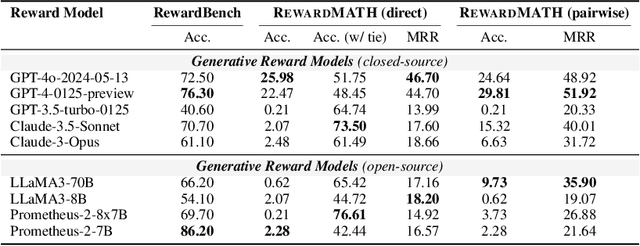

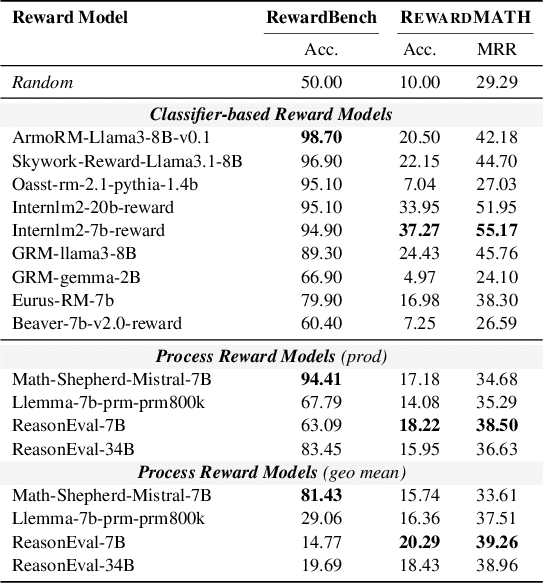
Abstract:Reward models are key in reinforcement learning from human feedback (RLHF) systems, aligning the model behavior with human preferences. Particularly in the math domain, there have been plenty of studies using reward models to align policies for improving reasoning capabilities. Recently, as the importance of reward models has been emphasized, RewardBench is proposed to understand their behavior. However, we figure out that the math subset of RewardBench has different representations between chosen and rejected completions, and relies on a single comparison, which may lead to unreliable results as it only see an isolated case. Therefore, it fails to accurately present the robustness of reward models, leading to a misunderstanding of its performance and potentially resulting in reward hacking. In this work, we introduce a new design for reliable evaluation of reward models, and to validate this, we construct RewardMATH, a benchmark that effectively represents the robustness of reward models in mathematical reasoning tasks. We demonstrate that the scores on RewardMATH strongly correlate with the results of optimized policy and effectively estimate reward overoptimization, whereas the existing benchmark shows almost no correlation. The results underscore the potential of our design to enhance the reliability of evaluation, and represent the robustness of reward model. We make our code and data publicly available.
Coffee-Gym: An Environment for Evaluating and Improving Natural Language Feedback on Erroneous Code
Sep 29, 2024



Abstract:This paper presents Coffee-Gym, a comprehensive RL environment for training models that provide feedback on code editing. Coffee-Gym includes two major components: (1) Coffee, a dataset containing humans' code edit traces for coding questions and machine-written feedback for editing erroneous code; (2) CoffeeEval, a reward function that faithfully reflects the helpfulness of feedback by assessing the performance of the revised code in unit tests. With them, Coffee-Gym addresses the unavailability of high-quality datasets for training feedback models with RL, and provides more accurate rewards than the SOTA reward model (i.e., GPT-4). By applying Coffee-Gym, we elicit feedback models that outperform baselines in enhancing open-source code LLMs' code editing, making them comparable with closed-source LLMs. We make the dataset and the model checkpoint publicly available.
Large Language Models Are Self-Taught Reasoners: Enhancing LLM Applications via Tailored Problem-Solving Demonstrations
Aug 22, 2024Abstract:Guiding large language models with a selected set of human-authored demonstrations is a common practice for improving LLM applications. However, human effort can be costly, especially in specialized domains (e.g., clinical diagnosis), and does not guarantee optimal performance due to the potential discrepancy of target skills between selected demonstrations and real test instances. Motivated by these, this paper explores the automatic creation of customized demonstrations, whose target skills align with the given target instance. We present SELF-TAUGHT, a problem-solving framework, which facilitates demonstrations that are "tailored" to the target problem and "filtered" for better quality (i.e., correctness) in a zero-shot manner. In 15 tasks of multiple-choice questions of diverse domains and the diagnosis of Alzheimer's disease (AD) with real-world patients, SELF-TAUGHT achieves superior performance to strong baselines (e.g., Few-shot CoT, Plan-and-Solve, Auto-CoT). We conduct comprehensive analyses on SELF-TAUGHT, including its generalizability to existing prompting methods and different LLMs, the quality of its intermediate generation, and more.
THEANINE: Revisiting Memory Management in Long-term Conversations with Timeline-augmented Response Generation
Jun 16, 2024



Abstract:Large language models (LLMs) are capable of processing lengthy dialogue histories during prolonged interaction with users without additional memory modules; however, their responses tend to overlook or incorrectly recall information from the past. In this paper, we revisit memory-augmented response generation in the era of LLMs. While prior work focuses on getting rid of outdated memories, we argue that such memories can provide contextual cues that help dialogue systems understand the development of past events and, therefore, benefit response generation. We present Theanine, a framework that augments LLMs' response generation with memory timelines -- series of memories that demonstrate the development and causality of relevant past events. Along with Theanine, we introduce TeaFarm, a counterfactual-driven question-answering pipeline addressing the limitation of G-Eval in long-term conversations. Supplementary videos of our methods and the TeaBag dataset for TeaFarm evaluation are in https://theanine-693b0.web.app/.
Language Models as Compilers: Simulating Pseudocode Execution Improves Algorithmic Reasoning in Language Models
Apr 03, 2024



Abstract:Algorithmic reasoning refers to the ability to understand the complex patterns behind the problem and decompose them into a sequence of reasoning steps towards the solution. Such nature of algorithmic reasoning makes it a challenge for large language models (LLMs), even though they have demonstrated promising performance in other reasoning tasks. Within this context, some recent studies use programming languages (e.g., Python) to express the necessary logic for solving a given instance/question (e.g., Program-of-Thought) as inspired by their strict and precise syntaxes. However, it is non-trivial to write an executable code that expresses the correct logic on the fly within a single inference call. Also, the code generated specifically for an instance cannot be reused for others, even if they are from the same task and might require identical logic to solve. This paper presents Think-and-Execute, a novel framework that decomposes the reasoning process of language models into two steps. (1) In Think, we discover a task-level logic that is shared across all instances for solving a given task and then express the logic with pseudocode; (2) In Execute, we further tailor the generated pseudocode to each instance and simulate the execution of the code. With extensive experiments on seven algorithmic reasoning tasks, we demonstrate the effectiveness of Think-and-Execute. Our approach better improves LMs' reasoning compared to several strong baselines performing instance-specific reasoning (e.g., CoT and PoT), suggesting the helpfulness of discovering task-level logic. Also, we show that compared to natural language, pseudocode can better guide the reasoning of LMs, even though they are trained to follow natural language instructions.
Can Large Language Models be Good Emotional Supporter? Mitigating Preference Bias on Emotional Support Conversation
Feb 20, 2024Abstract:Emotional Support Conversation (ESC) is a task aimed at alleviating individuals' emotional distress through daily conversation. Given its inherent complexity and non-intuitive nature, ESConv dataset incorporates support strategies to facilitate the generation of appropriate responses. Recently, despite the remarkable conversational ability of large language models (LLMs), previous studies have suggested that they often struggle with providing useful emotional support. Hence, this work initially analyzes the results of LLMs on ESConv, revealing challenges in selecting the correct strategy and a notable preference for a specific strategy. Motivated by these, we explore the impact of the inherent preference in LLMs on providing emotional support, and consequently, we observe that exhibiting high preference for specific strategies hinders effective emotional support, aggravating its robustness in predicting the appropriate strategy. Moreover, we conduct a methodological study to offer insights into the necessary approaches for LLMs to serve as proficient emotional supporters. Our findings emphasize that (1) low preference for specific strategies hinders the progress of emotional support, (2) external assistance helps reduce preference bias, and (3) LLMs alone cannot become good emotional supporters. These insights suggest promising avenues for future research to enhance the emotional intelligence of LLMs.
 Add to Chrome
Add to Chrome Add to Firefox
Add to Firefox Add to Edge
Add to Edge